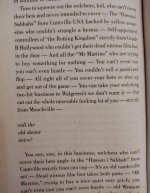You are using an out of date browser. It may not display this or other websites correctly.
You should upgrade or use an alternative browser.
You should upgrade or use an alternative browser.
The Ticket That Exploded
- Thread starter Benny Bunter
- Start date
-
- Tags
- a series of oblique references baggy bumhole due to heroin blue notes of pan can't even con can't even hustle cool mineral silence cuntsville usa diseased metal drumbeats of ghost people fish boy garden of delights hypnotizing chickens i wrote silences it's a sick picture b.j. knees up to the chin meme falling open shirt flapping picking up junkies for bum sex rectal mucus silence to say good bye smoke up the path something called love the final ape of history the happy cloak the japanese sandman the other half there are no good words what you need will hollywood never learn? word falling photo falling writing machine
luka
Well-known member
the menu for this eveningwere you holding an invisible cigaret or an invisble pencil woops?
version
Well-known member
Has anyone here actually done ayahuasca? My partner did it a couple of years back in a therapeutical context and she says she got a lot out of it, but it didn't sound like much fun to me.
shakahislop
Well-known member
the biggest cunt i know went to gabon to do ayahausca so i assume it's for cunts
Benny Bunter
Well-known member
.
It's an invisible copy of the ticket that explodedwere you holding an invisible cigaret or an invisble pencil woops?
Mr. Tea
Let's Talk About Ceps
Could be a Viz Top Tip:
"Save money by not going to South America for an ayahuasca retreat and instead simply booking a ferry trip when high winds are forecast and dropping some acid before you board."
Murphy
cat malogen
Not the music I was expecting to hear alongside spewing groans
All that scene needed to explode further was the presence of pigtails and Max Hardcore
Benny Bunter
Well-known member
Benny Bunter
Well-known member
The "Rotting Kingdom" must be an oblique Hamlet reference, and WSB sees himself as the subversive, intellectually superior Black Prince in the midst of the rotten Time, Life, Fortune media empire he so despises.
Benny Bunter
Well-known member
Hamlet also cuts in his own lines into the text of the Mouse Trap play-within-a-play to ensnare his rotten uncle Claudius and unveil his corruption - very Burroughsian techniqueThe "Rotting Kingdom" must be an oblique Hamlet reference, and WSB sees himself as the subversive Black Prince in the midst of the rotten Time, Life, Fortune media empire he so despises.
Benny Bunter
Well-known member
I think you could flesh out and pursue the Hamlet/Burroughs comparison really far actually - that transcendent nihilism.
"There are no good relationships - There are no good words - I wrote silences -"
Hamlet's last words -"The rest is silence."
"There are no good relationships - There are no good words - I wrote silences -"
Hamlet's last words -"The rest is silence."
version
Well-known member
I've been puzzling over what makes The Image so powerful since starting this. Flusser, in that interview I posted the other week, says the philosophy of images has a long history and most of it negative because there's a prejudice against the image in philosophy's Greek and Jewish tradition, the image is viewed as a copy, a simulation of thought, to be either forbidden to make or to be accepted with great distrust.
Benny Bunter
Well-known member
I've been puzzling over what makes The Image so powerful since starting this. Flusser, in that interview I posted the other week, says the philosophy of images has a long history and most of it negative because there's a prejudice against the image in the Greek and Jewish traditions, the image is viewed as a copy, a simulation of thought, to be either forbidden to make or accepted but viewed with suspicion.
What's this Flusser interview?
You ever read this?

A Few Don'ts by an Imagiste
Poems, readings, poetry news and the entire 110-year archive of POETRY magazine.
"An “Image” is that which presents an intellectual and emotional complex in an instant of time. I use the term “complex” rather in the technical sense employed by the newer psychologists, such as Hart, though we might not agree absolutely in our application.
It is the presentation of such a “complex” instantaneously which gives that sense of sudden liberation; that sense of freedom from time limits and space limits; that sense of sudden growth, which we experience in the presence of the greatest works of art."
The freedom from time and space limits definitely fits in with Burroughs.
version
Well-known member
version
Well-known member
I've just re-read that Cronenberg interview around eXistenz where he touches on this sort of thing:
 web.archive.org
web.archive.org
Bonus k-punk.
The deforming of reality is a criticism that has been levelled against all art, even religious icons, which has to do with man being made in God's image, so you can't make images of either.
BFI | Sight & Sound | Game Boy
Bonus k-punk.
version
Well-known member
You ever read this?

A Few Don'ts by an Imagiste
Poems, readings, poetry news and the entire 110-year archive of POETRY magazine.www.poetryfoundation.org
"An “Image” is that which presents an intellectual and emotional complex in an instant of time. I use the term “complex” rather in the technical sense employed by the newer psychologists, such as Hart, though we might not agree absolutely in our application.
It is the presentation of such a “complex” instantaneously which gives that sense of sudden liberation; that sense of freedom from time limits and space limits; that sense of sudden growth, which we experience in the presence of the greatest works of art."
It's interesting Pound's conception of an image isn't restricted to something to be looked at. It's more like a moment captured in any artistic medium and which comes to life again when encountered.

